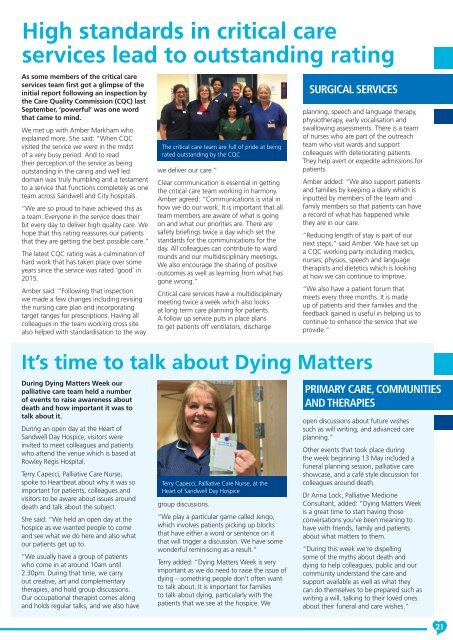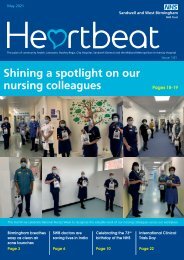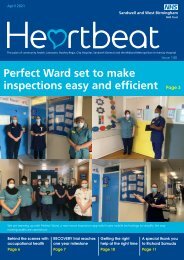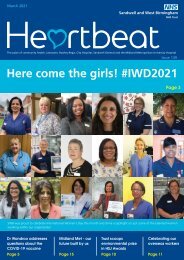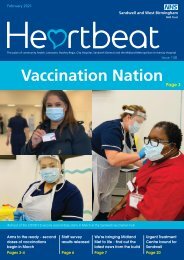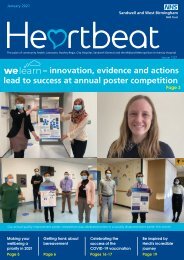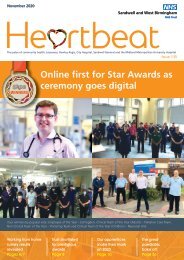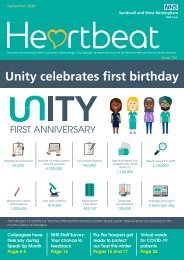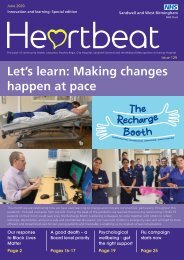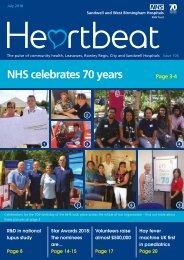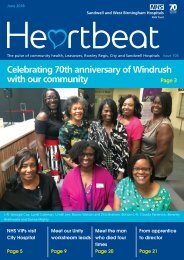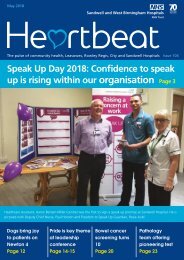Heartbeat: May 2019
Create successful ePaper yourself
Turn your PDF publications into a flip-book with our unique Google optimized e-Paper software.
High standards in critical care<br />
services lead to outstanding rating<br />
As some members of the critical care<br />
services team first got a glimpse of the<br />
initial report following an inspection by<br />
the Care Quality Commission (CQC) last<br />
September, ‘powerful’ was one word<br />
that came to mind.<br />
We met up with Amber Markham who<br />
explained more. She said: “When CQC<br />
visited the service we were in the midst<br />
of a very busy period. And to read<br />
their perception of the service as being<br />
outstanding in the caring and well led<br />
domain was truly humbling and a testament<br />
to a service that functions completely as one<br />
team across Sandwell and City hospitals.<br />
“We are so proud to have achieved this as<br />
a team. Everyone in the service does their<br />
bit every day to deliver high quality care. We<br />
hope that this rating reassures our patients<br />
that they are getting the best possible care.”<br />
The latest CQC rating was a culmination of<br />
hard work that has taken place over some<br />
years since the service was rated ‘good’ in<br />
2015.<br />
Amber said: “Following that inspection<br />
we made a few changes including revising<br />
the nursing care plan and incorporating<br />
target ranges for prescriptions. Having all<br />
colleagues in the team working cross site<br />
also helped with standardisation to the way<br />
The critical care team are full of pride at being<br />
rated outstanding by the CQC<br />
we deliver our care.”<br />
Clear communication is essential in getting<br />
the critical care team working in harmony.<br />
Amber agreed: “Communications is vital in<br />
how we do our work. It is important that all<br />
team members are aware of what is going<br />
on and what our priorities are. There are<br />
safety briefings twice a day which set the<br />
standards for the communications for the<br />
day. All colleagues can contribute to ward<br />
rounds and our multidisciplinary meetings.<br />
We also encourage the sharing of positive<br />
outcomes as well as learning from what has<br />
gone wrong.”<br />
Critical care services have a multidisciplinary<br />
meeting twice a week which also looks<br />
at long term care planning for patients.<br />
A follow up service puts in place plans<br />
to get patients off ventilators, discharge<br />
SURGICAL SERVICES<br />
planning, speech and language therapy,<br />
physiotherapy, early vocalisation and<br />
swallowing assessments. There is a team<br />
of nurses who are part of the outreach<br />
team who visit wards and support<br />
colleagues with deteriorating patients.<br />
They help avert or expedite admissions for<br />
patients.<br />
Amber added: “We also support patients<br />
and families by keeping a diary which is<br />
inputted by members of the team and<br />
family members so that patients can have<br />
a record of what has happened while<br />
they are in our care.<br />
“Reducing length of stay is part of our<br />
next steps,” said Amber. We have set up<br />
a CQC working party including medics,<br />
nurses, physios, speech and language<br />
therapists and dietetics which is looking<br />
at how we can continue to improve.<br />
“We also have a patient forum that<br />
meets every three months. It is made<br />
up of patients and their families and the<br />
feedback gained is useful in helping us to<br />
continue to enhance the service that we<br />
provide.”<br />
It’s time to talk about Dying Matters<br />
During Dying Matters Week our<br />
palliative care team held a number<br />
of events to raise awareness about<br />
death and how important it was to<br />
talk about it.<br />
During an open day at the Heart of<br />
Sandwell Day Hospice, visitors were<br />
invited to meet colleagues and patients<br />
who attend the venue which is based at<br />
Rowley Regis Hospital.<br />
Terry Capecci, Palliative Care Nurse,<br />
spoke to <strong>Heartbeat</strong> about why it was so<br />
important for patients, colleagues and<br />
visitors to be aware about issues around<br />
death and talk about the subject.<br />
She said: “We held an open day at the<br />
hospice as we wanted people to come<br />
and see what we do here and also what<br />
our patients get up to.<br />
“We usually have a group of patients<br />
who come in at around 10am until<br />
2.30pm. During that time, we carry<br />
out creative, art and complementary<br />
therapies, and hold group discussions.<br />
Our occupational therapist comes along<br />
and holds regular talks, and we also have<br />
Terry Capecci, Palliative Care Nurse, at the<br />
Heart of Sandwell Day Hospice<br />
group discussions.<br />
“We play a particular game called Jengo,<br />
which involves patients picking up blocks<br />
that have either a word or sentence on it<br />
that will trigger a discussion. We have some<br />
wonderful reminiscing as a result.”<br />
Terry added: “Dying Matters Week is very<br />
important as we do need to raise the issue of<br />
dying – something people don’t often want<br />
to talk about. It is important for families<br />
to talk about dying, particularly with the<br />
patients that we see at the hospice. We<br />
PRIMARY CARE, COMMUNITIES<br />
AND THERAPIES<br />
open discussions about future wishes<br />
such as will writing, and advanced care<br />
planning.”<br />
Other events that took place during<br />
the week beginning 13 <strong>May</strong> included a<br />
funeral planning session, palliative care<br />
showcase, and a café style discussion for<br />
colleagues around death.<br />
Dr Anna Lock, Palliative Medicine<br />
Consultant, added: “Dying Matters Week<br />
is a great time to start having those<br />
conversations you've been meaning to<br />
have with friends, family and patients<br />
about what matters to them.<br />
“During this week we're dispelling<br />
some of the myths about death and<br />
dying to help colleagues, public and our<br />
community understand the care and<br />
support available as well as what they<br />
can do themselves to be prepared such as<br />
writing a will, talking to their loved ones<br />
about their funeral and care wishes.”<br />
21


